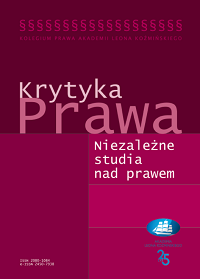Korematsu.
Too Early for the Court of History
Korematsu.
Too Early for the Court of History
Author(s): Waldemar HoffSubject(s): History of Law
Published by: Akademia Leona Koźmińskiego
Keywords: Korematsu; fifth column; sabotage; court of history; minorities; government powers; hybrid war
Summary/Abstract: In 1942 the American military authorities interned over 120 thousand persons ofJapanese ancestry in fear of sabotage on behalf of Japan. In a landmark 1944 casethe Supreme Court rehabilitated Fred Korematsu but upheld constitutionality ofthe wartime laws leading to the internment. As transpired later, there was noevidence of the Japanese-Americans’ forming a fifth-column. The court decisionwas criticized as unconstitutional and driven by racism. In view of the dissentingjudges and commentators it was condemned by the court of history. This articleclaims that the original decision was justified by the circumstances of the war,including the uncertainties it brought with it. Unless we equip the governmentwith the power of clairvoyance, it has to be able to act, and even err, in emergency.The debate around Korematsu ignored the previous experience of both World Warsin which German fifth columns were active and effective. One such eyewitnessaccount, not known in Western literature, is presented in the article. Modern historyconfirms that the fifth column as such is a timeless phenomenon. The fear ofhybrid wars techniques, justified or not, has led to the reemergence of the fifthcolumn legislation in XXI century, although the range legal instruments intendedto contain it is different. It is too early for judges and scholars to speak authoritativelyon behalf of the court of history, for history is still in the making.
Journal: Krytyka Prawa
- Issue Year: 11/2019
- Issue No: 4
- Page Range: 83-100
- Page Count: 18
- Language: English

